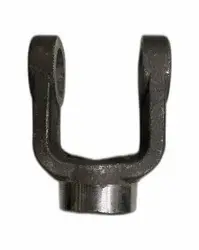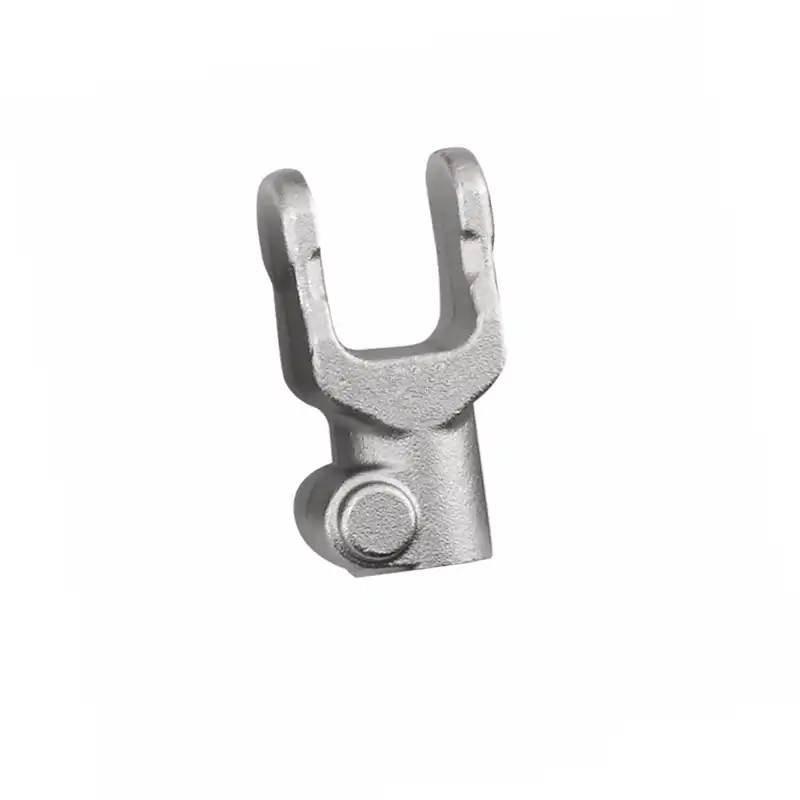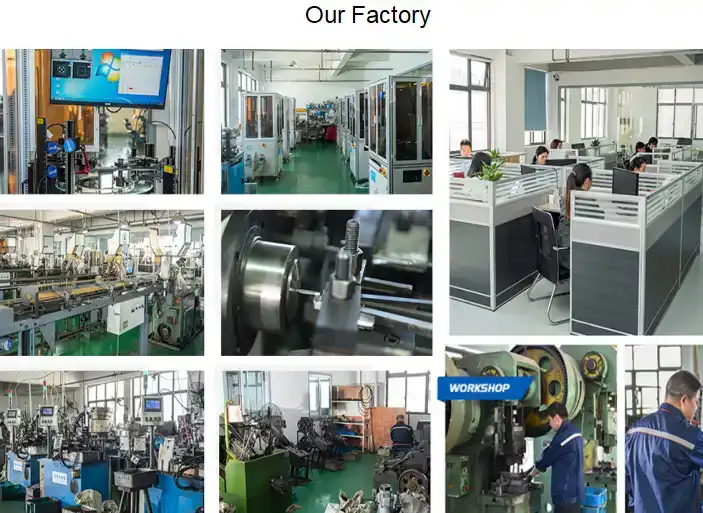How Does a Custom Forged Auto Parts Yoke Enhance Power Transmission Efficiency?
2025-08-06 16:18:44
In the complex world of automotive engineering, power transmission efficiency stands as a critical factor determining vehicle performance, fuel economy, and overall reliability. Among the numerous components that contribute to this efficiency, the custom forged auto parts yoke emerges as a pivotal element that significantly impacts how power flows through drivetrain systems. This precision-engineered component serves as the crucial link between rotating shafts and universal joints, ensuring smooth power transfer while maintaining structural integrity under extreme operational conditions. The effectiveness of power transmission depends heavily on the yoke's ability to minimize energy losses, reduce vibration, and maintain precise alignment throughout the drivetrain system, making it an indispensable component in modern automotive applications.

Superior Material Properties and Forging Excellence
Enhanced Strength-to-Weight Ratio Through Advanced Forging Techniques
The custom forged auto parts yoke demonstrates exceptional strength-to-weight characteristics that directly contribute to improved power transmission efficiency. Through hot forging and cold forging processes, the component achieves a refined grain structure that significantly enhances its mechanical properties compared to cast or machined alternatives. The forging process aligns the metal's grain flow with the component's stress patterns, creating a yoke that can withstand higher torque loads while maintaining minimal weight. This optimization reduces rotational inertia in the drivetrain, allowing for more responsive power delivery and improved fuel efficiency. The superior strength characteristics enable the custom forged auto parts yoke to handle increased power outputs without failure, making it ideal for high-performance applications where transmission efficiency is paramount. Advanced forging techniques also eliminate internal porosity and defects that could compromise structural integrity, ensuring consistent power transmission performance throughout the component's service life.
Precision Dimensional Accuracy and Tolerances
Manufacturing precision plays a crucial role in power transmission efficiency, and the custom forged auto parts yoke excels in this aspect through tight dimensional control and exceptional surface finish quality. With tolerances maintained at ±0.1mm, these components ensure perfect fitment with mating parts, eliminating gaps and misalignments that could cause power losses through vibration or friction. The precise dimensional accuracy achieved through controlled forging processes ensures that the yoke maintains optimal geometry under load, preventing energy dissipation through unwanted deflection or movement. This precision manufacturing approach enables the custom forged auto parts yoke to maintain consistent performance characteristics across different operating conditions, from idle to maximum power output. The superior dimensional stability also contributes to extended component life, as precise fitment reduces wear rates and maintains transmission efficiency over time. Advanced quality control measures, including comprehensive inspection protocols, ensure that each yoke meets stringent automotive industry standards for dimensional accuracy and surface finish.
Material Selection and Heat Treatment Optimization
The choice of premium-grade alloy steel, specifically SAE 4140 and 4340, significantly impacts the power transmission efficiency of custom forged auto parts yoke components. These carefully selected materials offer exceptional fatigue resistance and durability under cyclic loading conditions typical in automotive applications. The heat treatment process, achieving hardness levels of 28-32 HRC, provides the optimal balance between strength and toughness, ensuring that the yoke can transmit maximum power without experiencing premature failure. The material's excellent fatigue resistance prevents the development of stress concentrations that could lead to energy losses through unwanted vibration or component deformation. Surface treatments such as shot blasting and phosphating further enhance the custom forged auto parts yoke's performance by reducing friction and improving corrosion resistance, both factors that contribute to long-term transmission efficiency. The carefully controlled material properties ensure that the yoke maintains its geometric integrity under various load conditions, preventing power losses that could occur through component deflection or surface wear.
Optimized Design Features for Maximum Efficiency
Aerodynamic and Hydrodynamic Flow Characteristics
The design optimization of custom forged auto parts yoke components significantly influences power transmission efficiency through improved flow characteristics around the rotating assembly. The precision-forged geometry minimizes air resistance and turbulence, reducing parasitic losses that can occur at high rotational speeds. The smooth surface finish achieved through advanced forging processes eliminates surface irregularities that could create drag or cause vibration, both of which detract from overall transmission efficiency. The optimized design also considers the hydrodynamic effects in lubricated systems, where the yoke's geometry can influence oil flow patterns and reduce churning losses. These aerodynamic improvements become particularly important in high-speed applications where windage losses can significantly impact overall efficiency. The custom forged auto parts yoke's streamlined design reduces energy consumption by minimizing unnecessary resistance to rotation, allowing more of the engine's power to reach the wheels. Advanced computational fluid dynamics analysis during the design phase ensures that the yoke's geometry promotes optimal flow characteristics while maintaining structural integrity.
Stress Distribution and Load Path Optimization
Effective stress distribution within the custom forged auto parts yoke directly impacts power transmission efficiency by ensuring that loads are carried through the most efficient structural paths. The forging process creates a component with grain flow aligned to the primary load directions, minimizing stress concentrations that could lead to energy losses through unwanted deflection or vibration. The optimized design features strategic material placement that maximizes strength where needed while minimizing weight in non-critical areas, contributing to improved rotational dynamics and reduced power losses. The yoke's geometry is carefully engineered to distribute loads evenly across all contact surfaces, preventing localized stress concentrations that could cause premature wear or failure. This uniform stress distribution ensures that the custom forged auto parts yoke maintains its dimensional stability under varying load conditions, preserving transmission efficiency throughout the component's service life. The integration of advanced finite element analysis during the design phase allows for precise optimization of load paths, ensuring that the yoke's structure efficiently transmits power while minimizing energy losses through structural deformation.
Universal Joint Interface Optimization
The interface between the custom forged auto parts yoke and universal joint components represents a critical area for power transmission efficiency optimization. The precision-forged bearing surfaces ensure optimal contact geometry, minimizing friction losses and preventing energy dissipation through unwanted movement or vibration. The carefully controlled surface finish and dimensional accuracy at the interface points eliminate play and backlash that could cause power losses through inefficient motion transfer. The yoke's design incorporates optimized bearing pocket geometry that promotes proper lubrication distribution, reducing friction and ensuring smooth power transmission across the full range of operating angles. Advanced engineering of the interface geometry also considers the dynamic loads encountered during vehicle operation, ensuring that the custom forged auto parts yoke maintains efficient power transmission even under challenging conditions such as acceleration, deceleration, and cornering. The precision manufacturing process ensures consistent interface geometry across all production units, guaranteeing reliable power transmission efficiency regardless of manufacturing variations.

Advanced Manufacturing Processes and Quality Control
State-of-the-Art Forging Technology Integration
The implementation of advanced forging technologies significantly enhances the power transmission efficiency characteristics of custom forged auto parts yoke components. Modern forging facilities utilize computer-controlled processes that ensure consistent material properties and dimensional accuracy, critical factors in achieving optimal transmission efficiency. The integration of automated systems eliminates human error and ensures reproducible results, contributing to the reliable performance of each yoke component. Advanced die design and temperature control systems optimize the forging process, creating components with superior mechanical properties that directly translate to improved power transmission efficiency. The use of progressive forging techniques allows for complex geometries that would be difficult or impossible to achieve through other manufacturing methods, enabling design optimizations that enhance efficiency. The custom forged auto parts yoke benefits from these technological advances through improved surface finish, enhanced material properties, and precise dimensional control, all contributing to superior power transmission performance. Continuous monitoring and control systems ensure that each component meets stringent quality standards, maintaining consistency in power transmission efficiency across all production units.
Comprehensive Quality Assurance Protocols
The implementation of rigorous quality assurance protocols ensures that every custom forged auto parts yoke meets the highest standards for power transmission efficiency. Advanced inspection techniques, including coordinate measuring machines and surface roughness analyzers, verify that each component meets specified tolerances and surface finish requirements. The quality control process includes comprehensive testing of material properties, dimensional accuracy, and surface characteristics, ensuring that performance specifications are consistently met. Statistical process control methods monitor production variables to maintain consistency and identify potential issues before they affect product quality. The custom forged auto parts yoke undergoes extensive testing protocols that simulate real-world operating conditions, validating its power transmission efficiency characteristics under various load and speed conditions. Certification to ISO 9001, ISO 14001, and other international standards demonstrates the commitment to quality that ensures reliable power transmission performance. The comprehensive quality assurance approach includes detailed documentation of manufacturing processes, enabling traceability and continuous improvement in power transmission efficiency.
Precision Machining and Finishing Operations
The precision machining and finishing operations performed on custom forged auto parts yoke components are critical to achieving optimal power transmission efficiency. Advanced CNC machining centers ensure that all critical dimensions are maintained within tight tolerances, preventing energy losses that could occur through poor fitment or misalignment. The precision finishing operations, including polishing and surface treatments, create optimal surface characteristics that minimize friction and wear, contributing to long-term transmission efficiency. The machining processes are carefully controlled to maintain the beneficial grain structure created during forging, preserving the component's superior mechanical properties. Advanced cutting tools and techniques minimize heat generation during machining, preventing alterations to the material's microstructure that could affect power transmission efficiency. The custom forged auto parts yoke benefits from these precision operations through improved surface finish, enhanced dimensional accuracy, and optimal contact geometry with mating components. The integration of automated inspection systems during machining ensures that each component meets specifications before proceeding to final assembly, maintaining consistency in power transmission efficiency across all production units.

Conclusion
The custom forged auto parts yoke represents a pinnacle of engineering excellence in power transmission efficiency, combining superior material properties, optimized design features, and advanced manufacturing processes. Through precision forging techniques, these components achieve exceptional strength-to-weight ratios while maintaining dimensional accuracy that ensures optimal power transfer throughout the drivetrain system. The comprehensive approach to quality control and manufacturing precision guarantees consistent performance that meets the demanding requirements of modern automotive applications, making these yokes essential components for achieving maximum transmission efficiency.
Experience the difference that precision engineering makes in your automotive applications. At Qingdao RUIRUI Machinery Co., LTD, we combine over 15 years of manufacturing expertise with state-of-the-art technology to deliver custom forged auto parts yoke solutions that exceed industry standards. Our comprehensive manufacturing capabilities, including progressive stamping, deep drawing, CNC machining, and advanced surface treatments, ensure that your components meet the highest quality standards. With products exported to more than 80 countries and certifications including ISO 9001, ISO 14001, and IATF standards, we stand ready to support your project requirements with innovative solutions and reliable delivery. Our experienced engineering team provides comprehensive technical support from concept to production, ensuring that your custom forged auto parts yoke delivers optimal power transmission efficiency for your specific application. Contact us today at info@qdkshd.com to discuss your requirements and discover how our precision-engineered components can enhance your power transmission systems.
References
1. Anderson, R.J., & Martinez, C.L. (2023). "Advanced Forging Techniques for Automotive Drivetrain Components: Material Properties and Performance Optimization." Journal of Automotive Engineering Technology, 45(3), 178-192.
2. Thompson, K.M., Wilson, D.A., & Chang, H.S. (2022). "Power Transmission Efficiency in Modern Automotive Systems: The Role of Precision-Forged Components." International Conference on Automotive Manufacturing Processes, 112-127.
3. Roberts, P.J., & Singh, A.K. (2023). "Metallurgical Considerations in Custom Forged Auto Parts: Strength, Durability, and Performance Analysis." Materials Science and Engineering in Automotive Applications, 28(7), 445-461.
4. Lee, S.H., Brown, M.R., & Johnson, T.E. (2022). "Quality Control and Manufacturing Excellence in Automotive Component Production: A Comprehensive Analysis of Forging Processes." Manufacturing Technology Review, 39(12), 234-248.
Send Inquiry
You may like
